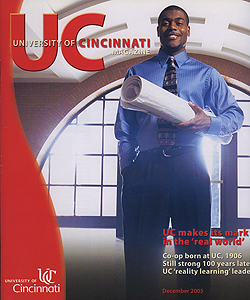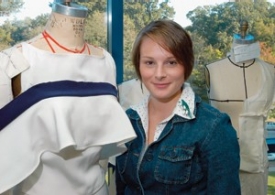By John Bach
Cooperative education, once a bold experiment at the University of Cincinnati, is today essential to success. Just ask the educators.
 December 2005
December 2005
Reality Learning
 Past Issues
Past IssuesBrowse our archive of UC Magazine past issues.
Cooperative education, once a bold experiment at the University of Cincinnati, is today essential to success. Just ask the educators.

Fashion design student Adrianne Gammie won a national design contest for her all-wool styles. Photo/Andrew Higley
These sentiments are echoed in all of UC's historic co-op colleges and particularly the College of Engineering and the College of Design, Architecture, Art, and Planning, where co-op is mandatory for all programs.
"We know that for virtually all of our students, co-op is the main drawing card," says Roy Eckart, interim dean of engineering. "When I'm talking to prospective students, the thing that I emphasize is that we are a mandatory co-op program.
"Our program is so big, so strong and so organized that co-op employers actually treat our students as engineers. By the time they are rising seniors, they have jobs that most young engineers would have when they get out of school."
The same holds true across campus at DAAP, where Dean Judith Koroscik often hears from employers who treat DAAP co-ops as full-time employees, as well.
"I came to UC because I was so excited about the quality of the programs, which are in large part reflective of this very unusual curricular structure we call mandatory co-op," Koroscik says. "What I liked about that so much is that UC has the incredible network of professional partners. As a professional school, which DAAP is, you really can't prepare students for the future if you don't know what's going on in your own field."
Both deans praise the foresight of those who established UC's built-in co-op network, the Division of Professional Practice, which takes responsibility for spanning the divide between the academy and industry. Eckart says other universities want to model UC's system but can't afford to invest the resources.
"If we had to restart the co-op program, we couldn't do it either," he says. "It is just too expensive. The cost would be too prohibitive. We have it in place, and we simply grow it a little bit as we need to grow it. The people in Professional Practice do just a tremendous amount of work to help place our students."
Anita Todd, one of those people in Pro Practice, spends her career building the triangular connections between electrical engineering students, the College of Engineering and employers.
"The most rewarding thing for me is when that student comes back in their senior year," Todd says. "And they say, 'You know what, this co-op made a huge difference in my career. Now I know what I want to do.' It is worth everything to have one student say that before graduation."
Todd meets with each student before and after each co-op assignment.
"You get to know them very well," she says. "I find out where their interests lie. I also try to gauge how they might do in an interview so I can guide them toward better interviewing skills."
In the end, Todd says, employers are looking for three things in a permanent hire -- technical competence, leadership and experience. "If you have two resumes in front of you, and one has a year and a half worth of career-related experience and one does not, you are going to interview the one with experience."
At the College of Business, around 40 percent of undergraduate students co-op, and Marianne Lewis, associate dean for innovation and program development, says the college would like to at least double that number.
"You have so much more to talk about in an interview once you have co-oped," she says. "It gives you a real leg up on students who haven't had that. Either you go directly to work for your co-op employer or you have an impressive portfolio of experiences."
Lewis compares the classroom to an experiment with controlled variables.
"In the real world, nothing is controlled," she says. "It is not so much that the accounting problem is going to change. It is that everything around the accounting problem can't be simulated in the classroom.
"What are the politics of getting the right figures? What are the relationships and the teams you are going to need to get your work done? How do you work with others to make things happen?"
To her, teaching becomes even more dynamic and perhaps more challenging for faculty when co-op students are in the mix.
"You just tend to have more critical thinkers in the class," Lewis says. "I just walked out of a junior class where I threw out an example about Toyota, and I had three co-op students from Toyota sitting in class say, 'Well, not exactly.' We had a great discussion because, in a class of 150 students, three of them had first-hand experience with the example.
"Then you have other people say, 'Well that's interesting, but that's very different than P&G.' It is like an MBA class. Everything is connected to a real-world issue."
At the College of Applied Science, co-op is mandatory for nearly all day students. Many, in fact, cite co-op as the main reason they apply there.
"The students want the real-world connection," says Allen Arthur, CAS associate dean. "The academic side is not enough for students seeking a well-rounded education.
"They know that the experience is critical to being competitive when they seek their full-time positions."
Arthur points to the college's high graduate placement figures, 93 percent over the last 10 years, as evidence of co-op's success.